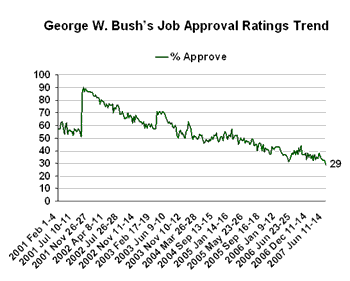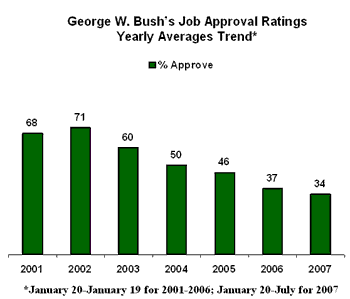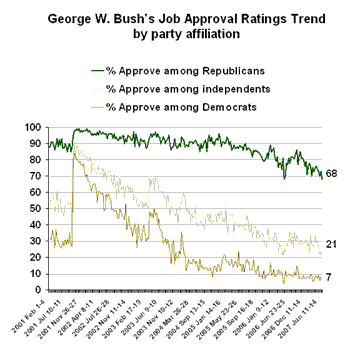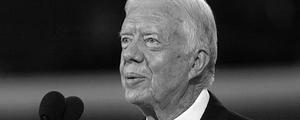GALLUP NEWS SERVICE
PRINCETON, NJ -- President George W. Bush's job approval rating is now at 29%, the new low point for his administration so far. Bush's current rating ranks in the bottom 3% of more than 1,300 Gallup presidential approval ratings since 1938. About two-thirds of Republicans continue to approve of the job Bush is doing, but his job approval rating is only 21% among independents and 7% among Democrats. Bush's job approval rating was an already low 37% as the year began, and it has dropped gradually since April. The range of job approval ratings for the entire Bush administration has been extraordinary, from 90% in September 2001 to the current 29%, a change of 61 percentage points.
Basic Trends
Bush's current job approval rating as measured in the July 6-8, 2007 USA Today/Gallup poll is 29%, down three percentage points from Gallup's previous measure in mid-June. The newest rating is two percentage points below Bush's previous low point of 31% in May of 2006. Bush's rating has been below 50% for more than two years and below 40% since October 2006.
The high point of the Bush administration was a record-high 90% in September 2001 in the aftermath of the terrorist attacks on New York City and Washington, D.C.

Bush's ratings have averaged 34% so far this year, reaching only as high as 38% in April. On a yearly basis, Bush's job approval rating has fallen each year since 2002.

Partisan Ratings
Bush continues to maintain the support of about two-thirds of Republicans, but has low ratings among Democrats and independents.

Sixty-eight percent of Republicans approve of the job Bush is doing, compared with 21% of independents and just 7% of Democrats.
Republicans' ratings of Bush are down five percentage points since mid-June. The 68% approval among members of his own party ties with a measure obtained in May 2006 as the lowest of his administration. As 2007 began, 79% of Republicans approved of the job Bush was doing as president.
Bush's rating among independents also ties for the low of his administration, although independents' ratings of Bush have been in the low 20% range at several points in the past year.
Democrats' rating of Bush show little change in recent months, with approval in the single digits in each poll with few exceptions over the past year.
Bush's Low in Historical Perspective
Bush's 29% approval rating is low by historical standards. Gallup has recorded 1,325 presidential job approval ratings since 1938, and only 42 -- or 3% -- have been below 30%. Only 32 job approval ratings have been below 29%.
This table displays all Gallup job approval ratings below 30%.
|
Presidential Job Approval at 29% or Lower Historically |
|||
|
Approval Rating |
Date |
||
|
% |
|
||
|
Truman |
22 |
1952 Feb 9-14 |
|
|
Truman |
23 |
1952 Jan 6-11 |
|
|
Truman |
23 |
1951 Nov 11-16 |
|
|
Nixon |
24 |
1974 Aug 2-5 |
|
|
Nixon |
24 |
1974 Jul 12-15 |
|
|
Truman |
24 |
1951 May 19-24 |
|
|
Truman |
24 |
1951 Apr 16-21 |
|
|
Nixon |
25 |
1974 May 10-13 |
|
|
Nixon |
25 |
1974 May 3-6 |
|
|
Nixon |
25 |
1974 Apr 12-15 |
|
|
Nixon |
25 |
1974 Feb 22-25 |
|
|
Truman |
25 |
1952 Jan 20-25 |
|
|
Truman |
25 |
1951 Jun 16-21 |
|
|
Nixon |
26 |
1974 Jun 21-24 |
|
|
Nixon |
26 |
1974 May 17-20 |
|
|
Nixon |
26 |
1974 Apr 19-22 |
|
|
Nixon |
26 |
1974 Mar 29-Apr 1 |
|
|
Nixon |
26 |
1974 Mar 8-11 |
|
|
Nixon |
26 |
1974 Jan 18-21 |
|
|
Truman |
26 |
1951 Feb 4-9 |
|
|
Nixon |
27 |
1974 Feb 8-11 |
|
|
Nixon |
27 |
1974 Jan 4-7 |
|
|
Nixon |
27 |
1973 Nov 2-5 |
|
|
Nixon |
27 |
1973 Oct 19-22 |
|
|
Truman |
27 |
1952 May 11-16 |
|
|
Truman |
27 |
1951 Mar 4-9 |
|
|
Carter |
28 |
1979 Jun 29-Jul 2 |
|
|
Nixon |
28 |
1974 Jun 28-Jul 1 |
|
|
Nixon |
28 |
1974 May 31-Jun 3 |
|
|
Nixon |
28 |
1974 Feb 1-4 |
|
|
Truman |
28 |
1952 Apr 13-18 |
|
|
Truman |
28 |
1951 Mar 26-31 |
|
|
Truman |
29 |
1951 Jul 8-13 |
|
|
Truman |
29 |
1951 Oct 14-19 |
|
|
Truman |
29 |
1951 Jul 13-18 |
|
|
Nixon |
29 |
1973 Dec 7-10 |
|
|
Carter |
29 |
1979 Jun 1-4 |
|
|
Carter |
29 |
1979 Jun 22-25 |
|
|
Carter |
29 |
1979 Jul 13-16 |
|
|
Carter |
29 |
1979 Oct 5-8 |
|
|
Bush |
29 |
1992 Jul 31-Aug 2 |
|
|
Bush |
29 |
2007 Jul 6-8 |
|
Most of these sub-30% job approval ratings were given to two presidents, Harry Truman and Richard Nixon. Jimmy Carter had one rating of 28% and several 29% ratings, and Bush's father had one rating of 29% in the summer of 1992.
Truman received the lowest approval rating in Gallup's history, with 22% of Americans approving of the job he was doing in February 1952. Nixon's 24% approval ratings came in the final month of his presidency before he resigned for his role in the Watergate scandal.
From a broader perspective, Bush is now one of five presidents since World War II who have recorded at least one job approval rating below 30%, joining Truman, Nixon, Carter, and the elder George Bush. Four additional presidents had administration low points in the 30s: Johnson, Ford, Reagan, and Clinton. Two presidents did much better -- Dwight Eisenhower's low point was only 49%, and John F. Kennedy's was 56%, recorded just two months before his assassination in November 1963.
|
Presidential Job Approval Low Points for Previous Presidents |
||
|
Approval Rating |
Date |
|
|
% |
|
|
|
Harry S. Truman |
22 |
Feb 1952 |
|
Dwight D. Eisenhower |
49 |
Jul 1960 |
|
John F. Kennedy |
56 |
Sep 1963 |
|
Lyndon B. Johnson |
35 |
Aug 1968 |
|
Richard Nixon |
24 |
Jul 1974, Aug 1974 |
|
Gerald Ford |
37 |
Jan 1975, Mar 1975 |
|
Jimmy Carter |
28 |
Jun 1979 |
|
Ronald Reagan |
35 |
Jan 1983 |
|
George H.W. Bush |
29 |
Jul 1992 |
|
Bill Clinton |
37 |
Jun 1993 |
|
George W. Bush |
29 |
Jul 2007 |
Bottom Line
President Bush's job approval rating -- now at 29% -- has fallen to the lowest point of his administration and is within seven percentage points of the lowest job approval rating in Gallup Poll history. Bush's job ratings have dropped 61 percentage points since the all time high point of 90% in September 2001.
The current job approval rating is not precipitously lower than previous readings. Bush had a 32% rating in mid June, and his previous low point of 31% in May 2006 was just two percentage points higher than his current rating. Instead, the current reading represents a continuation of a gradual downward drift in the president's ratings -- one in which each yearly average has been lower than the previous one, going back to 2003.
At this point, the public's view of the president has been affected to one degree or the other by the conflict in Iraq, his support for the now-aborted immigration bill, the Scooter Libby sentence commutation, and the negative way in which the public views the economy. Future changes in the public's attitudes toward any of these can affect Bush's job approval rating going forward. In general, the trajectory of Bush's ratings will depend, to a significant degree, on his ability to hold on to dwindling support among members of his own party -- now down to the two-thirds level.
Survey Methods
Results are based on telephone interviews with 1,014 national adults, aged 18 and older, conducted July 6-8, 2007. For results based on the total sample of national adults, one can say with 95% confidence that the margin of sampling error is ±3 percentage points. In addition to sampling error, question wording and practical difficulties in conducting surveys can introduce error or bias into the findings of public opinion polls.
